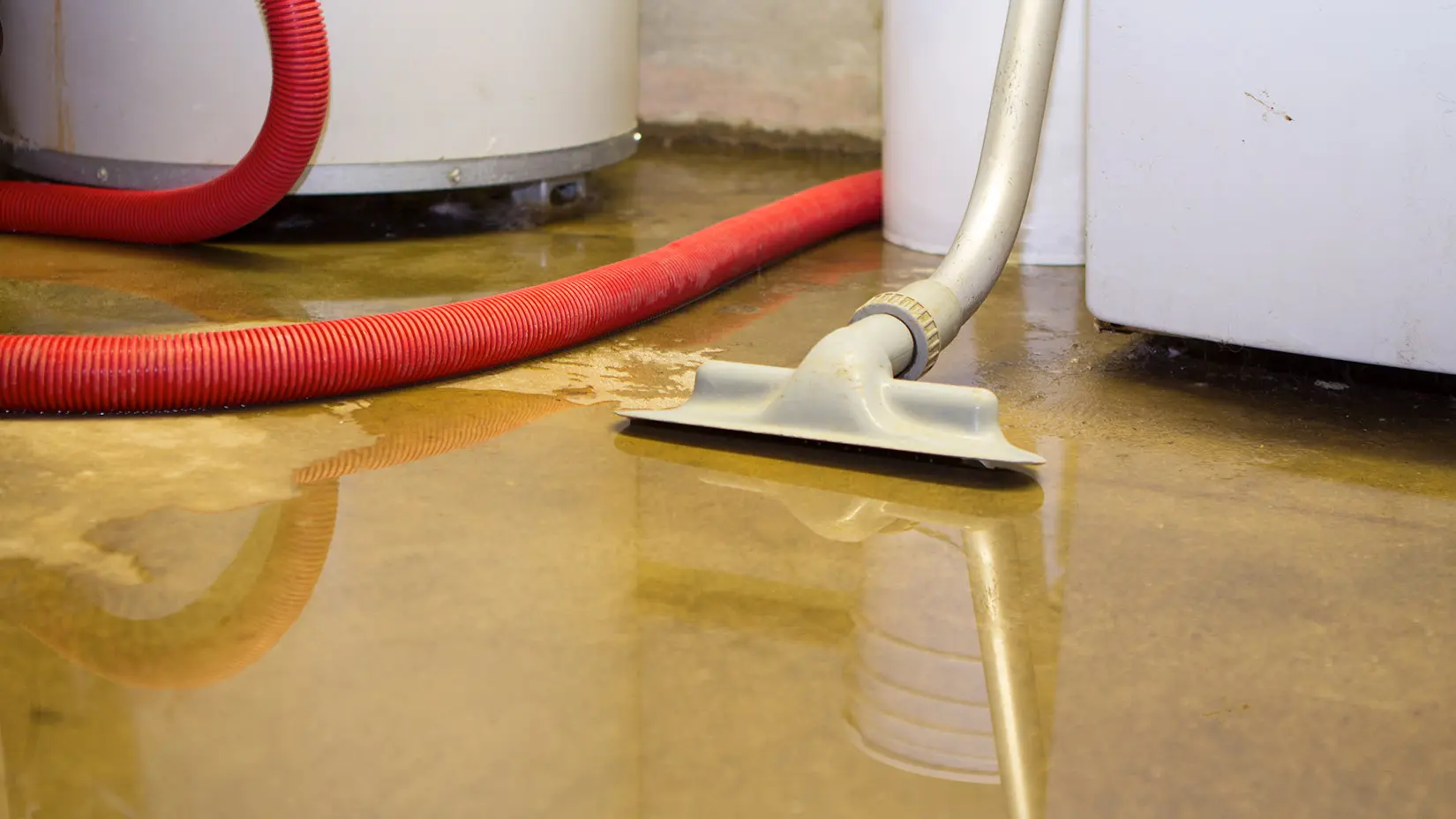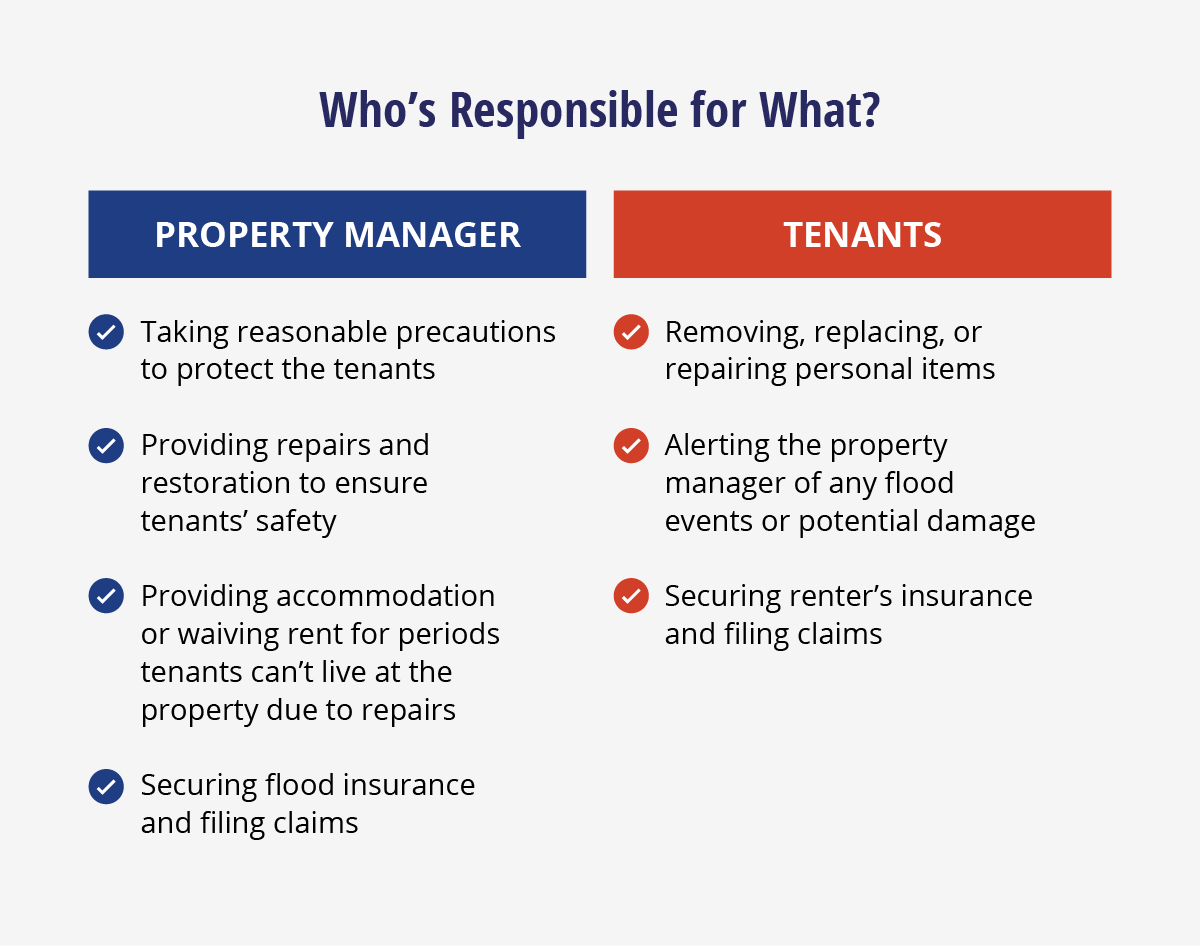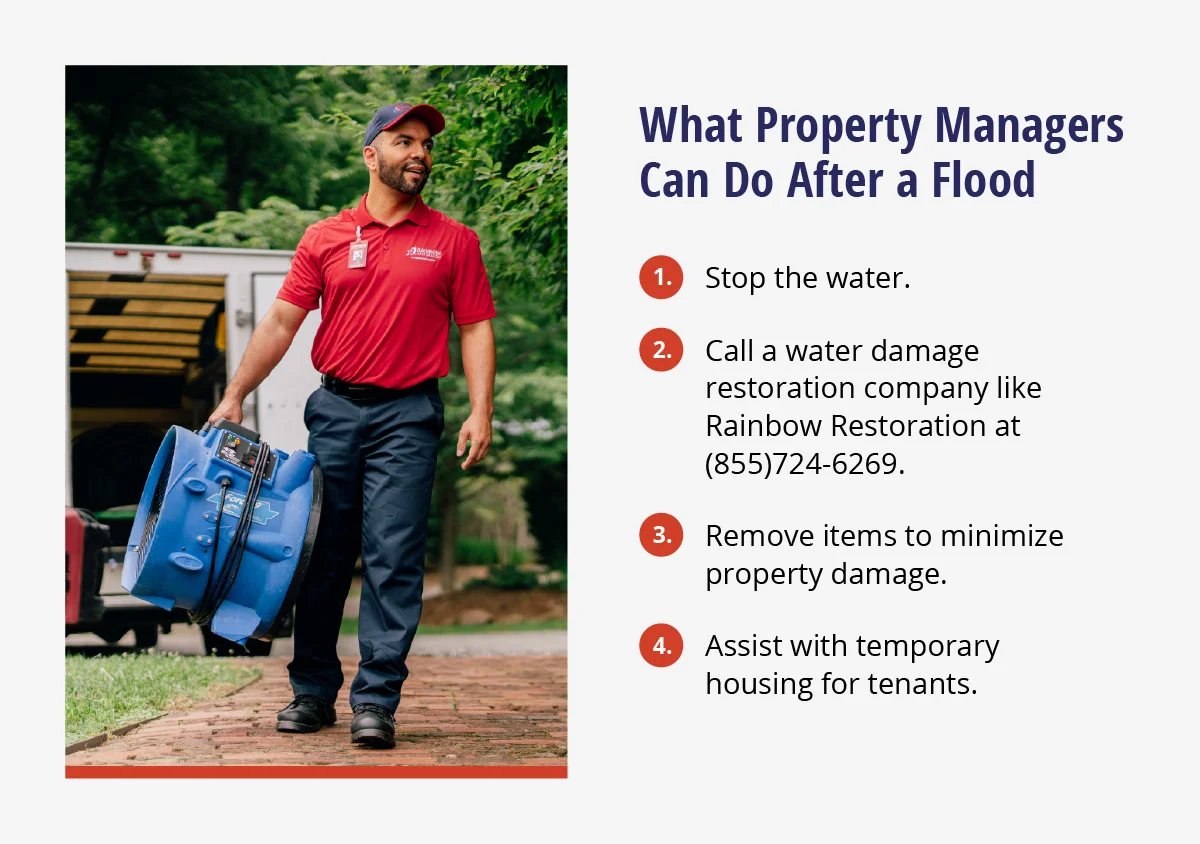
When a rental property floods, prompt action is crucial to minimize damage and ensure safety. Rainbow Restoration recommends taking the following steps:
|
As soon as tenants notice a flood, it is important to alert the property manager, ensure the safety of their pets and families, and remove personal items if they can. The property manager will file insurance claims and schedule professional flood recovery services and repairs promptly.
Property managers might not be worried about their property flooding if it’s located in a low-risk environment. But at some point, the property may experience water damage from leaky pipes or a broken appliance.
Knowing what to do when a rental property floods and how to arrange for professional flood recovery is essential for keeping tenants safe, reducing property damage, and adhering to local laws. This guide will cover property managers’ rights, property managers’ responsibilities, renters’ rights, renters’ responsibilities, and exactly what to do if a property or rental floods.
Call Rainbow Restoration® at 855-724-6269 now for rental property flood damage.

Who Is Responsible for Flood Damage: Landlord or Tenant?
Both property managers and tenants should know their rights and responsibilities when a flood happens. In general, property managers are responsible for repairing the property, and tenants are responsible for their personal property.
However, property managers can be responsible for personal property damage if it occurs due to negligence. For example, if the landlord told tenants a sump pump was installed on the property, but it isn’t true, the property manager may be held responsible for replacing any water-damaged personal property from a flood that could have been avoided with the installation of a sump pump.
If tenants’ negligence caused the property damage, the property manager must arrange repairs, but tenants can be billed to cover those repairs. An example would be if the tenants flooded the property by accidentally leaving a sink on.
These are important distinctions for both property managers and tenants to know in the event of a flood.
Property Manager’s Responsibility
After a flood, property managers are responsible for:
- Taking reasonable precautions to protect the tenants
- Providing building repairs and restoration to ensure tenants’ safety
- Providing accommodation or waiving rent for periods when tenants can’t live at the property due to repairs
- Filing flood insurance claims
A property manager or landlord’s responsibility for flood damage is to repair and restore the property. So, if a basement floods, the landlord must repair and restore any property damage, such as replacing flooring, drywall, or electrical wiring.
Property managers are not responsible for their tenants’ personal property. For example, if the tenants have a storage unit in the basement. The property manager is not responsible for replacing any items the tenants stored in the unit when the flooding occurred.
Tenant’s Responsibility
After a flood, a tenant is responsible for:
- Removing, replacing, or repairing personal items
- Alerting the property manager of any flood events or potential damage
- Filing renters insurance claims
Tenants are responsible for repairing or replacing any personal property, such as clothing or furniture, that is damaged during a flood. If tenants cause the flood, they may be billed for repairs, though property managers still need to arrange those repairs.
Laws vary on whether tenants can break their lease due to flooding.

Property Managers: What To Do After a Flood
Emergencies happen, even to property managers and tenants who’ve been diligent about maintenance. If there is a plumbing failure or weather-related flooding at a rental property, be prepared to act quickly and minimize the damage.
- Stop the water: If the cause of the flooding is a burst pipe, make sure you or your tenant turn off the main water shut-off valve as soon as possible.
- Call a water damage restoration company: It’s important to call professionals trained to handle water damage. Even small events involving water can lead to mold, warped wood, and stained walls if not treated quickly. If you notice signs of water damage, call Rainbow Restoration to schedule a professional water damage remediation.
- Minimize property damage: Lift curtains, draperies, or upholstered furniture skirts away from wet carpets or standing water. If your property has two stories, move as many items as possible to the second floor. Let professionals remove the water and dry the structure using proven drying techniques.
- Assist with temporary housing: If the property needs to be evacuated, help your tenants find temporary housing.
How Long Does a Landlord Have To Fix Water Damage?
State laws vary in how long a landlord or property manager has to fix water damage. Typically, they must resolve the issue within 30 days. They may also need to provide alternative lodging or a rental waiver in the meantime if the property isn’t safe for tenants to inhabit.
Does Landlord Insurance Cover Rental Property Water Damage?
Landlord insurance usually doesn’t cover flood damage. Like other policies, water damage might be covered if it results from a covered peril. Flood damage is unlikely to be covered unless the property has a flood insurance policy.
Property Managers: How To Prepare a Rental Property for a Flood
As George Washington once said, your best defense is a strong offense. Before you rent a property, make sure you’ve done as much as you can to prevent water damage.
1. Get the Plumbing Inspected
To prevent leaky appliances or burst pipes, hire a plumbing professional to inspect your property. They’ll crawl under the home, investigate every water source, and look for signs of pipe corrosion, damaged fixtures, or other evidence of potential leaks.
2. Check the Roof
Have the roof and inside the attic examined for leaks or signs of water damage. You should have the roof checked about twice a year and look out for:
- Broken shingles
- Cracked gutters
- Mold
- Discolored ceilings inside the property
3. Perform Regular Maintenance
Some maintenance practices can reduce damage to the property if a flood occurs. If the property is located in an area with high flood risk, install a sump pump to remove excess water and reduce the chances the property will flood from a natural disaster. Routine maintenance in the form of clearing gutters, repairing leaks, and properly maintaining septic systems can also reduce the chances of flooding the property.
4. Know Your Flood Risk
Use the FEMA website to see if your property is in a high-risk flood zone. If it is, ensure your flood insurance policy is current.
5. Prepare Your Tenants
Once you’ve leased the property, make sure your tenants have renters insurance to cover any water damage not covered by the landlord’s policy — like personal property and temporary housing. Also, be sure tenants know where the main water shut-off valves are in case of a water emergency.
Tenants: What To Do After a Flood
If you’re a tenant, you might be wondering what to do if your apartment floods. Here’s what you can do to remain safe and reduce damage to your personal property.
- Remove family members and pets: The most important thing is to keep you and your family safe. Ensure you know where everyone is, and block off the flooded area from pets if you intend on reentering the property to remove personal items.
- Turn off electricity and gas: If it’s safe to do so, shut off your property’s electricity and gas, especially after a weather-related flood. If you’re not sure it’s safe, call the utility company and have them send someone to shut them off.
- Remove personal property: If you’re able to safely remove personal property, such as sentimental items or furniture, from the flood zone.
- Inform the property manager: Once you’ve taken the basic steps to protect your family and items, you should alert your property manager as soon as possible. They will be responsible for arranging water damage remediation and restoration.
Does Renters Insurance Cover Water Damage?
A standard renters insurance policy typically doesn’t cover flood damage. Depending on the circumstances, flood insurance might be more appropriate. If water damage occurs due to a covered peril, then it might be covered. For example, if the policy covers snowstorms and a blizzard creates a leaky roof, then the policy might cover the water damage.
Hire Professional Water Damage Restoration for Your Rental
If your rental property experiences a water damage event, contact the professionals at your local Rainbow Restoration. Rainbow Restoration has a team of certified water damage restoration experts that are available 24/7, 365 days a year, to help minimize loss of property and get tenants back into their homes as soon as possible.
Rainbow Restoration can help remove damaged items, put up tarps to prevent further damage, and make sure the floors are dried in a way that avoids warping. Most importantly, the experienced Rainbow Restoration team will make sure no mold or odors remain after the water is gone.
Contact Rainbow Restoration at 855-742-6269 or request an appointment online to get professional water damage restoration today.
This article is intended for general informational purposes only and may not be applicable to every situation. You are responsible for determining the proper course of action for your property. Services should be performed by licensed and experienced professionals. Rainbow Restoration is not responsible for any damages that occur as a result of this blog content or your actions. For the most accurate guidance, contact a Rainbow Restoration professional for a custom, on-site assessment.

